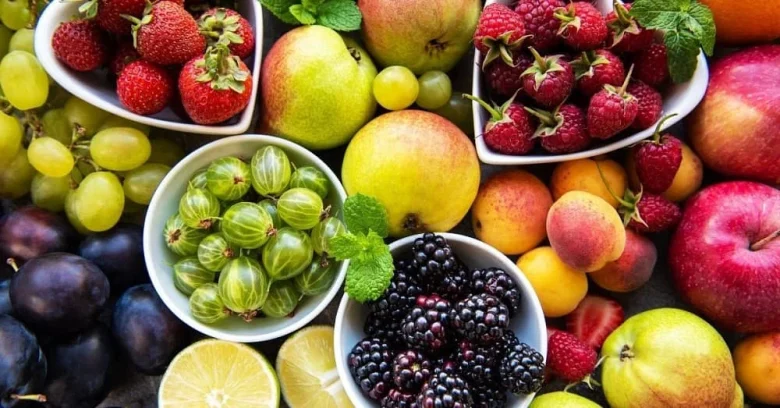Fruit is one of the easiest and best ways to improve your health and well-being. Fruit is a gift from nature, rich in fiber, vitamins, minerals, enzymes, and other things that are good for you. Eating a variety of fruits can help you stay healthy, prevent chronic diseases, and strengthen your immune system. In this article, we discuss the best reasons to eat fruit and how they can help your health.
1. Rich Source of Essential Nutrients
Fruit is a great way to get the important nutrients your body needs to stay healthy. They contain large amounts of vitamins such as folic acid, vitamin C, and vitamin A, which are important for the proper functioning of the body. Vitamin C is found in oranges, strawberries, kiwis, and other foods. It promotes tissue growth and healing, strengthens the immune system, and fights free radicals. Fruits such as mangoes and apricots are rich in vitamin A, which is important for your eyes, skin, and immune system. Folic acid is found in many foods, such as citrus fruits and avocados. It is an important part of cell division and DNA synthesis.
2. High in Dietary Fiber
Fruit contains a lot of fiber, which keeps your intestinal system healthy. Fiber helps keep bowel movements regular, prevents constipation, and reduces the risk of intestinal problems such as diverticulitis. Additionally, it helps control blood sugar levels and lower cholesterol, thereby reducing the risk of heart disease. Apples, pears, and bananas are foods high in dietary fiber, which are good for digestion.
3. Rich in Antioxidants
Many fruits contain antioxidants that protect the body against reactive stress and free radical damage. Free radicals are unstable chemicals that can damage cells. They also accelerate aging and worsen long-term conditions such as diabetes, cancer, and heart disease. Antioxidants eliminate these free radicals, making them less dangerous. Antioxidants help protect the body and improve overall health. Fruits such as blueberries, strawberries, and oranges contain large amounts of these substances.
4. Helps the Immune System
If you eat a lot of vegetables, your immune system will be stronger and better able to fight infections and diseases. Fruit contains large amounts of antioxidants, vitamins, and minerals that strengthen the nervous system. Citrus foods contain vitamin C, which helps your body produce more white blood cells needed to fight infections. Some other fruits, such as kiwi, papaya, and berries, also have properties that help keep your immune system strong and healthy.
5. Good for the Heart
Eating fruit every day can make a big contribution to heart health. Fruit is good for your heart because it is low in cholesterol, salt, and saturated fat. Fruits such as oranges and bananas contain high amounts of fiber, which can lower cholesterol, while potassium helps control blood pressure. Fruit also contains antioxidants that protect the heart and blood vessels from oxidative damage. This reduces the risk of heart disease. Research shows that eating plenty of vegetables can lower your risk of heart disease or stroke.
6. Helps you Lose Weight
Fruit can help you control your weight because it is low in calories and high in fiber. Fruit contains fiber, which gives you a feeling of fullness, making you less likely to overeat. You can use fruits in place of high-calorie snacks to help you control your calorie intake and achieve weight loss. Fruits like apples, berries, and oranges are high in water and fiber, which is great for helping you control your weight.
7. Good for the Skin
The vitamins and antioxidants in the fruit can help keep your face healthy. Vitamin C is known to help the body produce collagen, which keeps the face firm and youthful. Antioxidants protect the skin against damage caused by UV radiation and air pollution, preventing skin problems and premature aging. Fruits like watermelon, papaya, and mango keep your skin hydrated and provide it with the nutrients it needs to look healthy and beautiful.
8. Reduce the Risk of Chronic Diseases
If you eat a lot of vegetables, you are less likely to develop chronic diseases such as diabetes, cancer, and heart disease. Fruit contains fiber, which helps control blood sugar levels, is good for your heart, and contains vitamins that fight oxidative stress. By making insulin work better, eating fruit regularly has been shown to reduce the risk of type 2 diabetes. In addition, some foods contain chemicals that can fight cancer, reducing the risk of several types of cancer.
9. Improve Mental Health
Eating vegetables can be good for your mental health. Fruit contains important nutrients that are good for the brain and mental health. For example, antioxidants in vegetables help protect the brain from oxidative stress, which can make people less smart over time. Studies show that foods like avocados, berries, and citrus fruits can help your brain and memory. Fruit also contains vitamins and minerals that help maintain mood stability and reduce the effects of depression and worry.
10. Stay Hydrated
Fruit consists mainly of water, which keeps the body hydrated. Staying hydrated is important to keep body processes running smoothly, such as digestion, circulation, and temperature control. Fruits like watermelon, cucumbers, and oranges contain a lot of water, which can keep you hydrated all day long. Making sure you stay hydrated will also benefit your skin, kidneys, and energy levels.
Conclusion
In summary, eating a variety of fruits daily can benefit your health in many ways. Fruits are a powerhouse for health and fitness because they are rich in antioxidants and important nutrients that help keep your heart healthy and your immune system strong. Making fruit a regular part of meals and snacks can benefit your health, protect you from chronic diseases, and make your life happier and healthier.
FAQs
1. How many pieces of fruit should you eat daily?
Most experts say you should eat at least two to four pieces of fruit per day. This may be different for each person depending on their dietary needs and the rules set by health groups. A medium serving of fruit, 1/2 cup chopped fruit, or 1/4 cup dried fruit will work.
2. Can it be harmful to eat too much fruit?
Lots of fruit is good for you, but too much fruit can cause you to consume too many calories and sugar, which can affect your weight and blood sugar levels. To maintain a healthy diet, it is important to eat a mix of fruits and other foods.
3. Which vegetables can best help you lose weight?
Apples, berries, and oranges are all great fruits for weight loss because they are rich in fiber and water. They’re low in calories and keep you feeling full for longer, so they’re perfect for any weight-loss plan.
4. Which foods are good for your skin?
Oranges, strawberries, and papaya are just a few examples of foods that are good for your skin because they are rich in vitamin C and antioxidants. They help the body produce collagen, protect against UV damage, and keep the skin hydrated and youthful.
5. Can eating fruit help prevent chronic diseases?
Certainly. People who eat a lot of fruit are less likely to develop long-term diseases such as diabetes, heart disease, and cancer. Fruit contains good enzymes, fiber, vitamins, and minerals that can help prevent these diseases.




